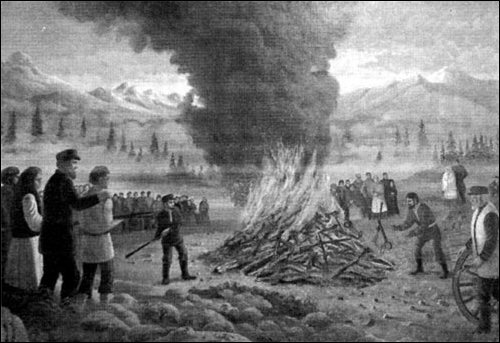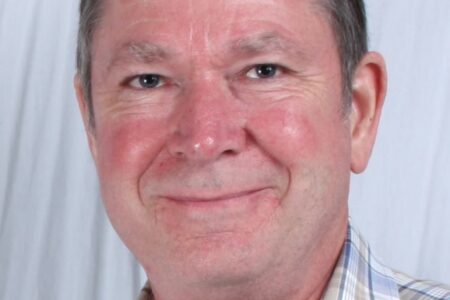COMMENT: Thoughts on the future of the Doukhobors in Canada
I’ve had Doukhoborism on my mind lately. A number of months ago I was asked if I would put some thoughts together about the modern day relevance of St. Peter’s Day (or Petrov Dien) for inclusion in the Canadian Doukhobor Society newsletter. I was happy to say yes as over the past few years I’ve been thinking more and more about what it means to be a Doukhobor in an era where increasingly the term is one talked about in the past tense rather than the future (or even the present). I’ve been wrestling with the increasing realization that one day in the not too distant future I may very well find myself as literally one of the last of the Doukhobors.
Should you think that I’m being melodramatic, let’s look at some statistics. In May of this year the latest data from the 2011 Canadian census related to religion and ethnic originwas released. According to the census data, there are just 2,290 Canadians that self-identify as Doukhobor. This follows an unmistakable trend of a shrinking Doukhobor population in Canada in each and every census since the Doukhobor population’s peak in the 1941 census at 16,898. It is also a rapidly ageing population, with 38% of those self-identifying as Doukhobor being 65 years or age or older – more than double the rate of the Canadian population as a whole of which 15% are 65+. As they say, demographics are destiny.
When I think back to my own Doukhobor journey, I realize that I was fortunate to be a “child” of the brief resurgence amongst the Saskatchewan Doukhobor community in the lead up to the 1995 centennial celebrations of the Burning of the Arms and the 1999 centennial of the Doukhobor migration to Canada. The 1990s gave me an opportunity in my formative years to be actively involved with and learn about my cultural and spiritual roots and traditions. Many didn’t have those same opportunities however, and even fewer do today. The reality is that in many Doukhobor communities we will soon lose the generation of elders who carry the cultural and spiritual traditions of Doukhoborism with them.
A few years ago I had the opportunity to attend the Harvard Kennedy School of Government in Cambridge, Massachusetts to take a Master in Public Policy degree. While there, I was part of a fascinating course on “Moral Leadership” which was designed for extensive self-reflection. As a focus for that reflection, we would often turn to the three questions that were originally posed by the Jewish elder Hillel some two thousand years ago:
- If I am not for myself, who will be for me?
- When I am for myself, what am I?
- And if not now, when?
When I read those questions now, and think about them in the Doukhobor context, they haunt me. The Doukhobor story is an inspiring one that speaks to the vision of creating a more caring, loving and peaceful world. It is also a story that speaks to the great adversity that exists to any attempt to change the existing order, which is something that we reflect on extensively on St. Peter’s Day. Yet if I am being honest, I struggle with a vision of Doukhoborism that is anchored in the actions of the past. Being a “spirit wrestler” is, by its very definition, something that is active and fluid – yet too often our conversation is rooted firmly in a fixed past with little discussion about how to translate that to the problems of the present or a vision for the future.
I had the opportunity to talk about the Doukhobors and my own personal journey during another one of my leadership classes at Harvard. I had a remarkable exchange with my professor, whom is a world-renowned expert on the topic of adaptive leadership, which went on for over 20 min (while a class of over 100 from literally every corner of the world learned about the Doukhobors for the first time). At the end of it all, his final words on the subject were as follows:
“The adaptation of the values and virtues and competence and wisdom embedded in these loyalties [to the Doukhobor community] as it applies to today’s problems, right now, may require preserving and conserving and holding constant a lot of that wisdom, but not all of it. But you don’t know which of it to value and which not. As you put your hands though it, you have to be able to approach it with an open mind to begin to figure out what adaptations are required to apply the best of my Spirit Wrestling tradition to the problems of people today. You probably do have, and your community probably does have, real contributions to make to lots of peoples in the world. But not by simply in a wholesale fashion, almost a mindless fashion, just applying the software you’ve got to this particular application. It would have to be reconfigured a little bit, wouldn’t it?”
There are no easy answers to some of the questions I am raising. What I do know with certainty is that Doukhoborism as we have known it for centuries is on the verge of disappearing. The time for a serious conversation about what parts of our collective past we want to preserve and be able to pass on is rapidly coming to a close. Simply put: we are out of time.
I believe though that there is a very limited window that still exists to do some important work as a community as we prepare for whatever Doukhoborism is to become in this next century. Specifically, new Internet and multimedia technologies provide us an opportunity that has not existed before to capture and share the essence of our Doukhobor “spirit wrestling” tradition in powerful new ways. In recent months I have been having discussions with a number of people, including some talented friends in the field of multimedia design and documentary film making, about ways in which we can capture that “essence” of Doukhoborism.
Ours is a story that needs to be not only preserved but also given life for future generations. So as I reflect on the modern relevance of St. Peter’s Day, I think the question that all of us should ask is: what steps are we taking right now to ensure that those remembrances, values and pieces of universal wisdom that are so core to what we celebrate on St. Peter’s Day aren’t lost to history?
— originally posted at ryanandrosoff.ca



























Comments